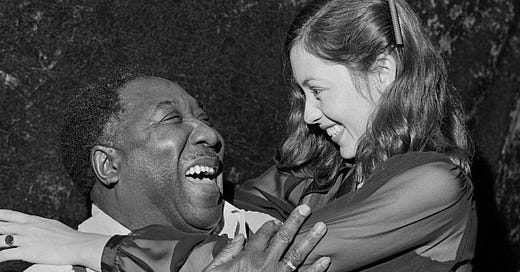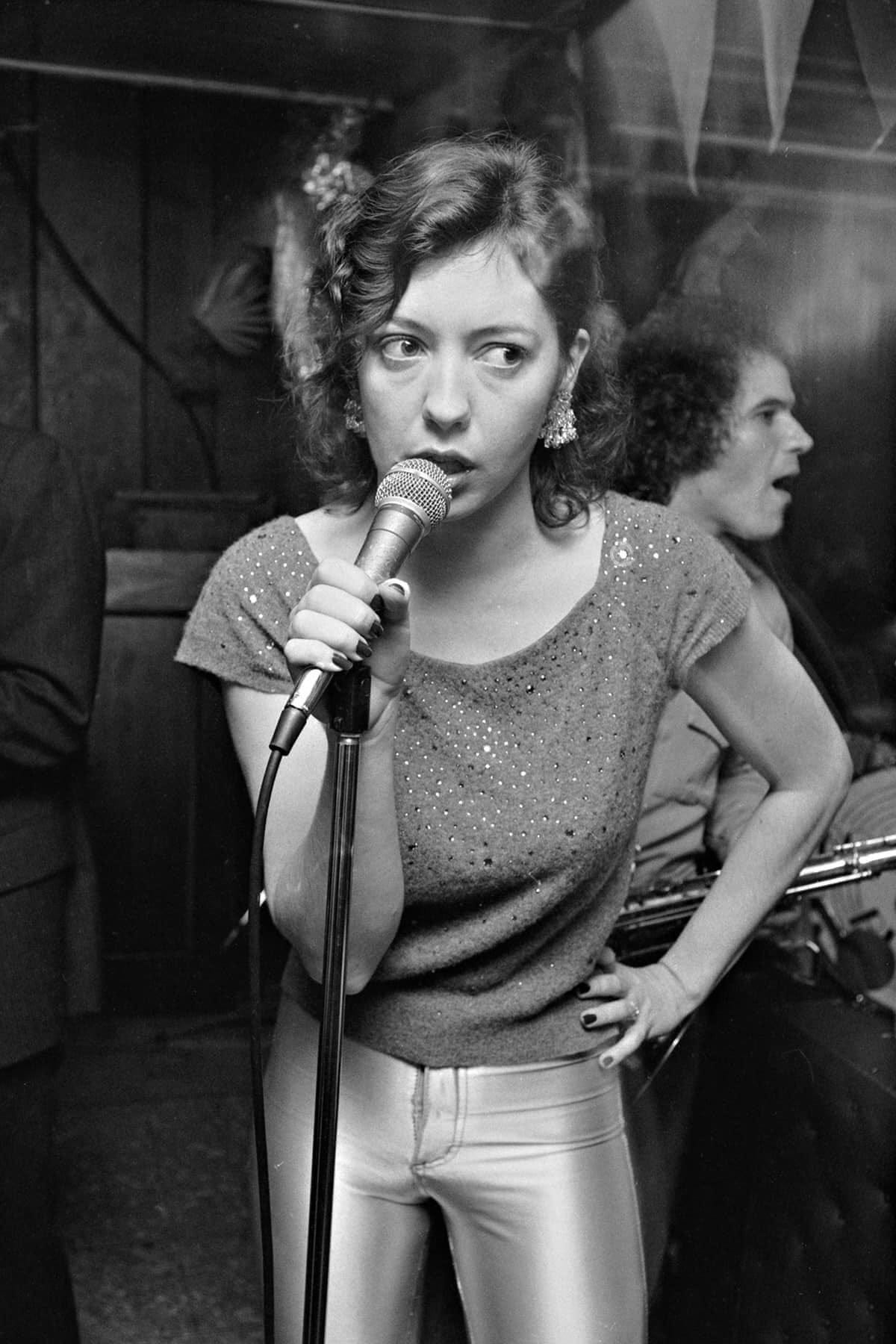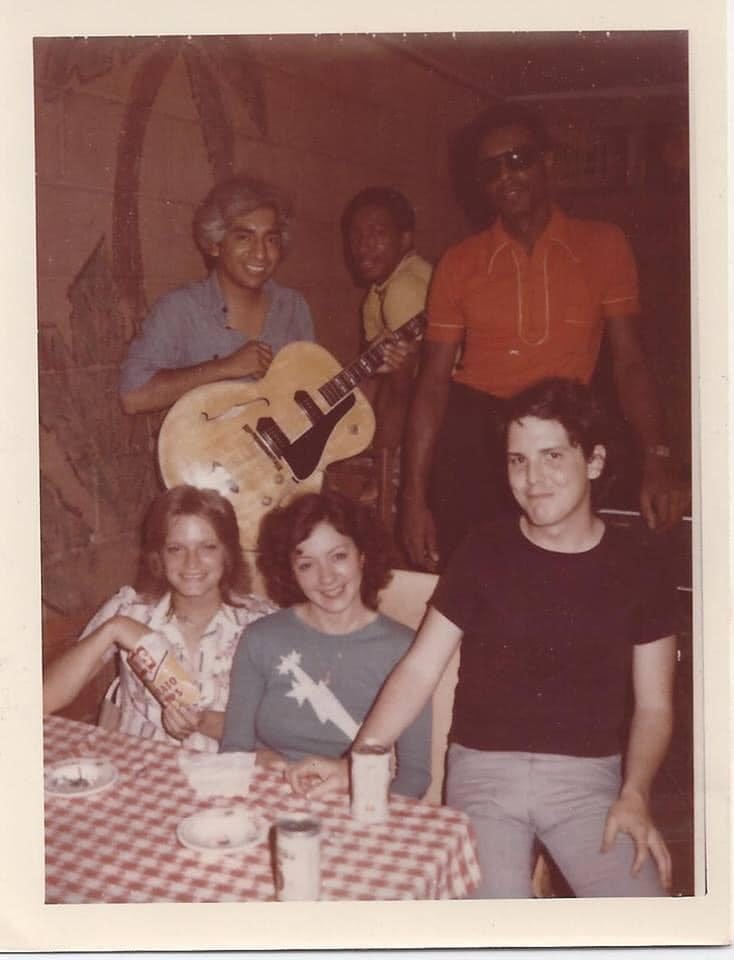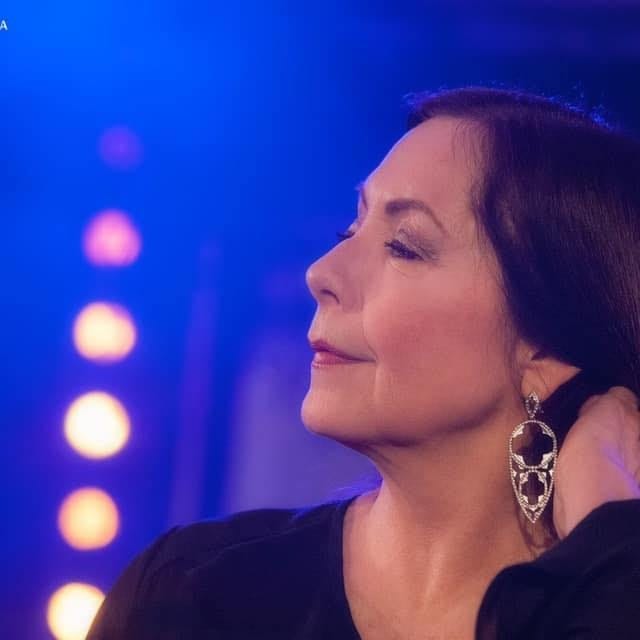“Why aren’t you a big star, yet?” the reporter from an Illinois newspaper asked a 31-year-old Lou Ann Barton between sets at the Continental Club in 1985. “I don’t know,” she answered. “I figured it would’ve happened by now.” Her 1982 debut LP Old Enough, co-produced in Muscle Shoals by the legend Jerry Wexler and Glenn Frey of the Eagles, was supposed to seal the celebrity her voice promised. But the Elektra/Asylum label was in the process of being just Elektra, and since Barton signed to Asylum, she wasn’t a priority, even though her album rated a four-star review in Rolling Stone. It didn't help that she showed up late and tipsy at a showcase for Elektra execs in New Orleans.
When the label slashed the budget on the followup Forbidden Tones, which was supposed to be produced by fellow Fort Worthian T Bone Burnett (whose line “When the night falls, it falls on me” was inspired by Lou Ann), Barton ended up producing herself. The new wavish record eventually came out in 1986 on Spindletop, but did not advance her career. Nor did manager Miles Lourie, who refused to be fired, as with previous client Barry Manilow, so fan Bette Midler lent her lawyers, pro bono, to get Lou Ann out of that deal. Lourie was replaced by Barton’s boyfriend Joe Hatcher, a good-looking guy with no experience.
It was in the middle of all this that I wrote my first feature story (“An Intermission in the Fairytale”) for the Austin Chronicle, which put Miss Lou Ann on the cover of the Nov. 30, 1984 issue. She’s the only local act to make me starstruck, beginning with the way she’d flick her lit cigarette on the dancefloor before she’d start singing “You Can Have My Husband (But Please Don’t Mess With My Man).”
I was so nervous about the interview I led with a question about her about working with T-Bone Walker on the new album. “He’s been dead for years,” Lou Ann said. Suffering fools gladly was yesterday. Her apartment on South Lamar was tasteful and immaculate, with avocado green walls and flowers in big glass vases. I expected something funkier, and self-expressive, a reflection of the greatest white blues singer since Janis Joplin.
This was the place Elvis Costello and the Attractions got drunk watching Barton’s collection of old country music television shows before a second, impulsively added, show at the Austin Opera House. They played a sloppy, all-country set opening for Nick Lowe, instead of the other way around, with Lou Ann coming out for a duet on Patsy Cline’s “She’s Got You” that raised goosebumps on leather.
The mid-’80s was not a great time for Miss Lou Ann’s career, but I followed her and her great band (David Grissom and Derek O’Brien on guitars, Sarah Brown on bass, Michael Ramos on keyboards, Rodney Craig on drums) all over town like a groupie. Didn’t really mind that her setlist was almost identical each night, with the main variable being which Roky Erickson song she’d cover- “Don’t Slander Me” or “Starry Eyes.” The show always ended spectacularly with “You’re Gonna Miss Me” by the 13th Floor Elevators. “Well, whicha you boys wants to go first?” she’d ask her guitarists before the solo break- and the crowd would just lose themselves. Lou Ann would grab the microphone like it was a cold beer and sing as if seeking simultaneous approval from Wanda Jackson, Etta James and Mick Jagger. When her lived-in voice and backwoods phrasing ("man' became "may-yen,' "ways' became "why-ays') met the band, there was nothing going on in the world except what was onstage.
I got to Austin too late to see “Miss Lou Ann” with Stevie Ray Vaughan in Double Trouble, but there are a couple of YouTube videos that could’ve led to charges of arson. In Nov. ‘79, Barton left Stevie to join Rhode Island’s Roomful of Blues, who heard her sing at the Rome Inn on their first Texas tour earlier that year. In an interview with Ed Ward on the eve of her hometown return at Soap Creek in Feb. 1980, Lou Ann said, “I was in a terrible rut with Double Trouble, and I didn’t even know it. I was enjoying my rut!” The story of the Austin music scene.
Barton expressed deep homesickness from the northeast. “They don’t have Mexican food up here,” she told Ward. “They don’t even have Mexicans.” A quickie marriage to T-Birds bassist Keith Ferguson in March ‘80 brought Lou Ann back to Austin after just four months with R.I.’s jump blues kings. But her short stint with Roomful included an incendiary show at the Bottom Line attended by Wexler, who thought he’d found a sassier Linda Ronstadt. He called Barton “the best singer since Aretha Franklin” and got her signed. When Frey played rough mixes of Old Enough for his friend Ronstadt, she said Lou Ann “scares the hell out of me.”
She was washed up in the eyes of the music industry just three years later. But Miss Lou Ann has always been a star on the Austin club circuit. She’s just so real in every way.
Born in 1954, Lou Ann Barton grew up the daughter of a truck driver who played guitar and piano on weekends, and a mother who listened to country radio nonstop. Older brothers would blast Chuck Berry and Little Richard from their bedroom, records which made Lou Ann want to be a singer- at age 5. She dropped out of high school in the 10th grade to sing at F.W.’s New Bluebird blues dive. Calling her “the Female Little Richard,” Jimmie Vaughan recruited Barton to move to Austin and sing with his new band, the Fabulous Thunderbirds, in 1974. But one night at Alexander’s, a blues bar on far south Brodie Lane, Vaughan jammed with a harmonica player from California named Kim Wilson, and the way they told Lou Ann she was no longer in the band was to go on tour without her. She was waiting outside with her bags packed and they never came.
After a short stint in W.C. Clark’s Blues Revue, Barton and Clark teamed with Stevie Ray Vaughan to form the Triple Threat Revue. After Clark left to concentrate on his own thing, the band became Double Trouble in ‘78. Lou Ann’s departure for Little Rhody came at a time when Stevie was asserting himself as a vocalist. Taken for granted in Austin, where his reputation was as the loudest guitarist in a guitar town, the younger Vaughan’s fortunes changed after a sensational appearance at the 1982 Montreux Jazz Festival.
After drummer Mike Buck was replaced in the T-Birds by Fran Christina from Roomful of Blues, he moved back to Fort Worth and started a band called the Headhunters with a couple of St. Louis hotshots, Don Leady and Steve Doerr. That band eventually became the LeRoi Brothers, but they also gigged as Lou Ann’s band the Fliptops. The ‘80s found Barton on the club grind, truly in a rut this time, but the decade ended with the release of of Read My Lips, her best album, produced by Paul Ray for the Antone’s label. The next year Antone’s had its best-seller with Dreams Come True by Barton, Marcia Ball and Angela Strehli, the blues queens!
I was living in Chicago in November ‘91, when I went to see the Dreams trio at a big theater that was packed. Went backstage before the show to say hello to my favorite Austin singer, but she wasn’t there. Angela and Marcia were in tears when they told me that Lou Ann had showed up at the airport that day, barely conscious, propped up by her boyfriend. The airline check-in person took one look at Barton and said, "No way.' Strehli and Ball put her in a cab, fearing the worst.
"I'm just so afraid that when we get back home, Lou Ann is going to be . . . ' Marcia couldn't say "dead.' Barton had always been a party girl, with the constitution of a mule, but alcohol’s grip got tighter through the years. What started as white wine at night had become vodka for breakfast, and by the end of her lost decade she’d sit on a stool and ramble bawdily between songs. The opposite of AA meetings were Lou Ann Barton shows. Then she started canceling. Everyone knew she was just a real emotional girl fighting a losing battle against a foe much stronger.
But instead of going home to more vodka, Barton had the cab driver take her to the hospital. After four days of detoxification, she checked out and decided she would never drink again. She began attending 12-step meetings and starting getting some sun. I interviewed her six months sober and she said it felt like she was on acid, in a strange new world. But she didn’t wake up sick every afternoon anymore. “I didn't eat, I didn't menstruate, my fingernails wouldn't grow, I could barely stand up,” she said in ‘92. “I was dying and I didn't want to die, so I quit drinking.” Why can such an easy choice be so difficult?
As with her former cohort Stevie Ray, Lou Ann got better, musically, when she stopped doing all the shit she thought made her more authentic. But she also stopped chasing a career, aside from singing with Jimmie Vaughan for several years.
"As far as I'm concerned, my career is on hold,' she said in ‘92. "The important thing for me is to get better. I'm not in any hurry to fall into the same traps as before which might make me start all over with the drinking.” She had made it back from the living dead zone, knock wood.
Lou Ann Barton, the singer and person, was almost destroyed by the intense feelings that also almost made her famous. Some call it your soul, but it's just emotions. For Lou Ann, that's the last part that'll die.
(Photo of Lou Ann with Muddy Waters by Nicolas Russell)
Here’s a great Lou Ann Barton collection that came out a few years ago, including tracks with the Fabulous Thunderbirds not previously released.









"The opposite of AA meetings were Lou Ann Barton shows." Classic Corky.
Great profile. I wish I could go back in time to see one of her shows. The writing here is superb, Michael.